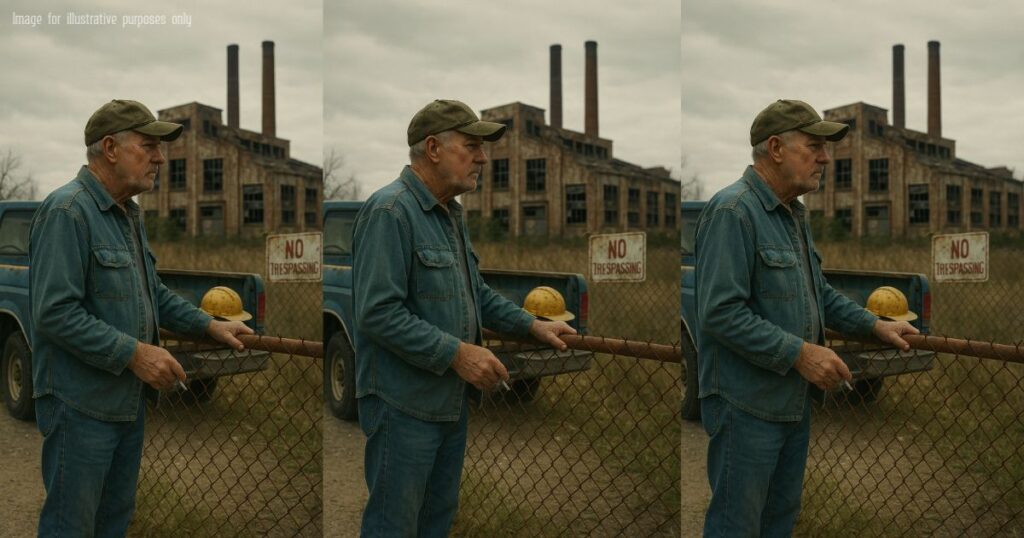Two days after I saw Frankie at the mill, he died.
Heart failure. In his sleep, they said. His daughter found him sitting in a recliner, still holding a photo of the mill crew from 1981—back when we all had black hair and bad mustaches and thought we’d last forever.
I didn’t cry right away. Not when his daughter called. Not at the funeral, either. The tears didn’t come until I found the envelope.
It was stuffed inside my coat pocket, crumpled and damp. I must’ve tucked it in without thinking—back when we were drinking and swapping lies in the ruins of Line B. On the outside, it just said:
“To the ones who stayed silent.”
Inside was a letter. Written in pencil. No punctuation. Just raw, like everything Frankie ever did:
**we built this country with our backs
they took our backs and bent them
they took our hands and numbed them
they took our words and buried thembut not all of us forgot
maybe we didn’t speak then
but we feel it now
and that means it’s not goneif you’re reading this
you were part of something realand real things don’t die**
I read it twice. Then again.
Something cracked open in me—like a splinter from old pine finally working its way free after decades. All these years, I’d carried shame like a second skin. Not for what I did. But for what I didn’t say, for the meetings I stayed quiet in, for the younger guys I didn’t fight for, thinking maybe silence would keep us afloat.
But silence never saved us. It just made the sinking quieter.
That night, I went down to the basement and dug through a box I hadn’t touched in fifteen years.
Inside were timecards. Old pay stubs. A chipped mug that said “Mill 42 Safety Week ‘92.” And a stack of letters I never mailed—drafts to corporate, to local news, even to my kids. Things I’d written and never dared to send. Words like:
“My job is more than a number.”
“I miss you but I don’t know how to show it.”
“I was proud, even when I pretended not to be.”
The next morning, I did something I never thought I would.
I mailed a letter to Trevor.
I wrote about the time he broke his arm in third grade and I couldn’t leave the mill because the press jammed. About the night I missed his high school graduation because our shift ran long. About how I told myself I was providing—but I knew, deep down, I was hiding behind the job because it was easier than being vulnerable.
And then I told him the truth:
“I didn’t fight for the mill. I didn’t fight for you. But I’m fighting now—with these words. With whatever time I’ve got left. If you ever want to talk, I’m here. For real this time.”
I didn’t expect a reply.
But he called three days later. Said he cried in the parking lot after reading it. Said he wanted to come visit with his son—my grandson, who I’ve only seen once through a screen door.
I hung up the phone and stared out the kitchen window, where the wind swayed the pine trees behind our house. The same trees they used to chop down for pulp. The same trees that now whispered in the breeze like ghosts with second chances.
Last week, I printed Frankie’s letter and framed it. Took it back to the mill. Hung it right on the front gate with two rusted nails and a prayer.
I don’t know who’ll read it. Maybe nobody.
But maybe some kid will walk by someday, bike tires crunching gravel, and stop to look. Maybe he’ll ask his grandpa what it means. And maybe the old man will tell him:
“That’s where real men worked. And one day, they remembered to speak.”
And that’s the truth of it.
We weren’t perfect. We stayed quiet too long. But in the end, we found our voices—not in meetings or protests, but in letters and memories, in holding each other accountable, and in picking up the phone to say what should’ve been said a long time ago.
We were the last shift.
But we were never forgotten.
Because real things—honest things—don’t die.


